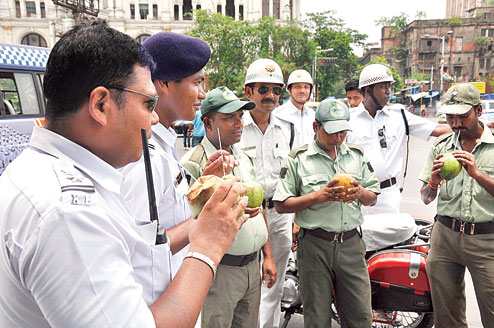
March 27: Bengal has decided to tweak its liquor licensing policy to turn off-shops located within 500 metres of national and state highways into sit-and-drink outlets, saving a precious source of revenue and sparing scores of such businesses an impending Supreme Court ban.
The Supreme Court has banned off-shops within the specified perimeter with effect from April 1, but possibly left open a window for consumption of liquor in bars, restaurants and on-shops.
An on-shop typically offers a place for the customer to sit and consume liquor. It is slightly different from a bar, where food and entertainment are also available. In contrast, an off-shop is strictly a takeaway counter where consumption of liquor is an offence.
At least 500 off-shops will remain in business because of the excise department's decision, government officials said.
Off-shops located along national and state highways, including stretches within Calcutta, had been plunged into uncertainty by the apex court's verdict on December 15.
"No shop for the sale of liquor shall be (i) visible from a national or state highway; (ii) directly accessible from a national or state highway and (iii) situated within a distance of 500 metres of the outer edge of the national or state highway or of a service lane along the highway," the three-member bench of former Chief Justice T.S. Thakur, Justice D.Y. Chandrachud and Justice L. Nageswara Rao said.
The court fixed a binding timeline based on which licences issued prior to the order would not be renewed after March 31. Signage and advertisements about availability of liquor were also prohibited through the same order.
"Off-shop licensees were concerned over the future of their business from next month and the government has to consider the revenue aspect. Accordingly, it is decided to give on-shop licences to the off-shop vendors when they come up for renewal," an official of the state finance department said.
"The government had to take into consideration both the verdict of the highest court and remain business-friendly as well. This is a beneficial step for all the stakeholders."
In January, the state government had dropped two roads in Calcutta from the list of state highways, taking several star hotels and scores of smaller establishments out of the purview of the Supreme Court order. It now appears that this decision was not required given the new interpretation of the order.
Off-shop owners expect at least a 25 per cent growth in revenue with an on-shop licence. "Our costs would go up but there is also a potential for higher returns," said the owner of a off-shop just outside city limits.
"We had approached the state government with our concerns and now they have come out with a solution," said Pradyut Saha, general secretary of the All Bengal Excise Licensees' Association.
The government has targeted excise revenue of Rs 4,778 core in 2016-17. Officials said the state was on course to achieve the target. In 2017-18, the government has budgeted excise collections of Rs 5,781.38 crore.
"This remarkable decision (to change the format of off-shops) by the Bengal government has extinguished any apprehension for negative impact on the sales volume in the coming years," liquor blending and distribution company Pincon Spirit Ltd said in a statement.











